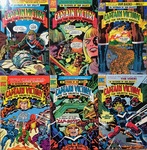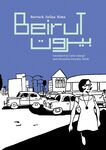
While Harlan Ellison's star has dimmed somewhat with the passing of the years, likely due, at least in part, to his abrasive personality, it remains hard to overstate his influence on science fiction, and then, in turn, on science fiction's invasion of and subsequent influence on mainstream fiction – particularly short fiction. Forty or so years ago, both "'Repent, Harlequin,' said the Ticktockman" and "I Have No Mouth, and I Must Scream" (written in 1966 and 1967, respectively) were among the most anthologized stories out there, with one or the other – sometimes both – being in the majority of high school and college short fiction 101 collections then in use.
He was born in 1934, was first published in the late 1950s, and wrote continuously up to his death in 2018, with his most important works being written in the 1960s and 1970s. He was also an important editor.
So, suffice it to say that he's worth reading, and currently, this 468 page collection is the best place to start. Edited by Ellison's executor, J. Michael Straczynski, with an introduction by Neil Gaiman and a preface by Cassandra Khaw.
Here's some of the praise garnered by Ellison that was assembled by the editor and publisher for this collection:
In his stories of fantasy and horror, he strikes closest to all those things that horrify and amuse us (sometimes both at the same time) in our present lives...Ellison has always been a sociological writer...[who was] pro-choice when itcomes to abortion...[and] an affirmed liberal and freethinker. Most of all, we sense outrage and anger—as with the best Ellison stories, we sense personal involvement, and have a feeling that Ellison is not so much telling the tale as he is jabbing it viciously out of its hiding place. It is the feeling that we are walking over a lot of jagged glass in thin shoes, or running across a minefield in the company of a lunatic.
—Stephen King
Categories are too small—even the catch-all category of science fiction—to describe Harlan Ellison. Lyric poet, satirist, explorer of odd psychological corners, moralist, one-line comedian, purveyor of pure horror and of black comedy; he is all these and more.
—The Washington Post
A furiously prolific and cantankerous writer (who) looked at storytelling as a "holy chore," which he pursued zealously for more than 60 years. His output includes more than 1,700 short stories and articles, at least 100 books and dozens of screenplays and television scripts ranked with eminent science fiction writers like Ray Bradbury and Isaac Asimov.
—The New York Times
Harlan Ellison was, after all, one of the most interesting humans on Earth. He was one of the greatest and most influential science fiction writers alive. He marched with Martin Luther King, Jr. in Selma, lectured to college kids, visited with death row inmates, and once mailed a dead gopher to a publisher. Ellison brought a literary sensibility to sci-fl at a time when the entire establishment was allergic to any notion of art. To say he was one-of-a-kind would be trite, and he would likely hate that. What he was, was a legend.
—NPR
[Harlan] was very influential in changing the field, making it more open to social issues, to explorations of characters. He's had an enormous influence on science fiction with his writing, and he's also been aninfluential editor...setting an agenda for a new kind of science fiction writing that would be more socially engaged and responsive to the times.
—Jeff Lathan, Science Fiction Studies
There's a real power to the way he uses the language and how he draws pictures in your mind.
—Ron Moore
You see Ellison's unswerving social conscience throughout his fiction and critical essays...forcefully and eloquently-and at some length lamenting the failure of the Equal Rights Amendment and railing against the scourge of misogynistic "knife-kill" films.
—Rogerebert.com
The words-there is an attention to the words. There is an attention to the sound of the words. You're reading them in your head, and they sing.
—Neil Gaiman
The spellbinding quality of a great nonstop talker, with a cultural ware house for a mind.
—The New York Review of Books
Feisty, furious, yet extraordinarily kind and generous; Harlan Ellison was one of a kind.
—Leonard Mahin
Harlan Ellison—terrific prose, razor-sharp intellect, pulp gut punches and invention when needed, terse poetics...an original.
—Guillermo del Toro
An original and valuable writer...a twentieth-century Lewis Carroll.
—Los Angeles Times
Saul Bellow, Philip Roth, Norman Mailer, stand aside. Harlan Ellison is now a better short story writer than you will ever be again during the rest of your lives.
—Ray Bradbury
The incredible Harlan Ellison writes as if an inner fuse is about to blow before he can get all the words on his pages.
—Anne McCaffrey
He doesn't write like anybody else. What emerges is a surprising, eclectic, almost protean series of visions, often disturbing, always strongly felt.
—Michael Crichton
Harlan was not just a great fantasist and/or science fiction writer; he was a great writer, period. When he was at the top of his form, there was no finer short story writer in all of English literature. [He] had an enormous influence on the writers of the generation that followed, my own generation. He fought for racial equality, marching with King at Selma. He fought for women's rights and the ERA. He fought publishers, defending the rights of writers to control their own material and be fairly compensated for it. He was a hero to us.
—George R. R. Martin
LIMITED TIME SPECIAL PRICE!













